|
|
|
Sort Order |
|
|
|
Items / Page
|
|
|
|
|
|
|
| Srl | Item |
| 1 |
ID:
154922
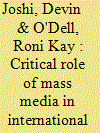

|
|
|
|
|
| Summary/Abstract |
What role does mass media play in the promotion of global norms? We address this question through an analysis of Human Development Reports (HDRs) produced by the United Nations Development Programme. Although HDRs have promoted human development ideology over the past twenty-five years, little is known about how and to what extent their messages have been disseminated to the public. Addressing this gap in the literature, we examine a critical intervening factor in the process of international norm diffusion: political communication via the mass media. Highlighting the importance of framing and agenda setting, we identify four communicative mechanisms that can facilitate norm diffusion: credibility, persistence, resonance, and decentralization. Through qualitative and quantitative content analysis, we assess how these mechanisms have enabled HDRs to attract favorable global media attention such that they are now cited much more frequently than their rival, the World Bank's World Development Reports.
|
|
|
|
|
|
|
|
|
|
|
|
|
|
|
|
| 2 |
ID:
156230
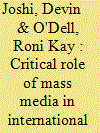

|
|
|
|
|
| Summary/Abstract |
What role does mass media play in the promotion of global norms? We address this question through an analysis of Human Development Reports (HDRs) produced by the United Nations Development Programme. Although HDRs have promoted human development ideology over the past twenty-five years, little is known about how and to what extent their messages have been disseminated to the public. Addressing this gap in the literature, we examine a critical intervening factor in the process of international norm diffusion: political communication via the mass media. Highlighting the importance of framing and agenda setting, we identify four communicative mechanisms that can facilitate norm diffusion: credibility, persistence, resonance, and decentralization. Through qualitative and quantitative content analysis, we assess how these mechanisms have enabled HDRs to attract favorable global media attention such that they are now cited much more frequently than their rival, the World Bank's World Development Reports.
|
|
|
|
|
|
|
|
|
|
|
|
|
|
|
|
| 3 |
ID:
121428
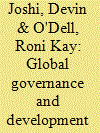

|
|
|
|
|
| Publication |
2013.
|
| Summary/Abstract |
This article compares the development ideologies of the United Nations and the World Bank by placing them on the left-right spectrum. It reviews previous ideological assessments of the two organizations and applies qualitative and quantitative content analysis of annual World Development Reports published by the World Bank and Human Development Reports issued by the United Nations Development Programme to examine their development discourse. Analysis of fifty-seven reports from 1978 to 2011 reveals two major findings. First, the World Development Reports have continuously articulated a development discourse to the right of the Human Development Reports. Second, there is clear evidence of convergence in the reports over time toward the political center.
|
|
|
|
|
|
|
|
|
|
|
|
|
|
|
|
| 4 |
ID:
107443
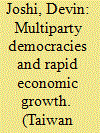

|
|
|
|
|
| Publication |
2011.
|
| Summary/Abstract |
This essay examines whether developing countries with competitive multiparty
democracies may be just as capable of sustaining rapid economic growth
as single-party states. It begins with a literature review identifying political
stability and the ability to mobilize labor and capital production inputs as key
factors behind sustained rapid growth. It then develops the hypothesis that under
certain conditions, multiparty democracies may be strong in these dimensions,
but ceteris paribus, single-party states are likely to have an advantage. I test
this hypothesis by exploring historical trends in rapid growth over the last five
decades. Statistical regression analysis confirms that most sustained highgrowth regimes have not been competitive multiparty democracies. On a more
optimistic note, however, the number of high-growth multiparty democracies
increased significantly during the period between 2000 and 2009, signaling a
possible breakthrough in the twenty-first century.
|
|
|
|
|
|
|
|
|
|
|
|
|
|
|
|
| 5 |
ID:
114602
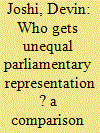

|
|
|
|
|
| Publication |
2012.
|
| Summary/Abstract |
In 2010, India celebrated its 60th anniversary as a democracy and Sri Lanka held its first post-civil war election. Yet, inequalities in parliamentary representation remain strong in both nations. This research note highlights current geographic, ideological, and demographic parliamentary inequalities in India and Sri Lanka. It finds major social groups especially women, those under age 40, the less educated, Indian Muslims, and those employed in the agricultural sector to be significantly under-represented. On the other hand, it finds provisional support for the hypothesis that Sri Lanka's proportional representation (PR) electoral system better facilitates equal representation than India's single member district (SMD) system.
|
|
|
|
|
|
|
|
|
|
|
|
|
|
|
|
|
|
|
|
|